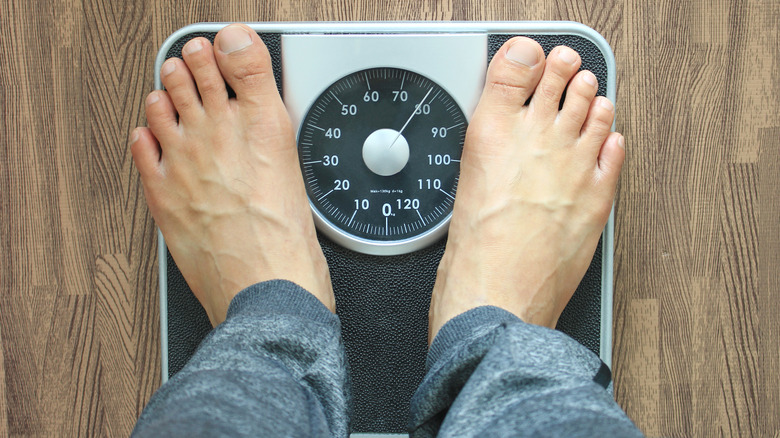Don't Believe This Midnight Snack Myth
Myths emanate from folk wisdom, word of mouth, and, worst of all, the internet. Numerous myths and misconceptions have been passed down through generations as false facts. And it's truly fascinating how people embrace myths so quickly, even if there's not a shred of scientific, or any other kind of evidence, to support them. For instance, some people may believe the pandemic myth about green tea and COVID-19. And "MythBusters" debunked the tale most of us have heard of how a penny dropped from the top of the Empire State Building can kill someone below (per Insider). And no, you cannot see the Great Wall of China from space.
Some of us have even gullibly believed a "food fact," only to learn later that it wasn't true. In fact, some of the craziest food myths have been debunked. You can find bizarrely wrong science "facts" about food, such as eating more than six bananas at once could kill a person because they contain a lethal dose of potassium. And then there are fast food myths that are actually false, such as McDonald's use of fake eggs in its McMuffins. As if food myths weren't enough, there's a widely held misconception related to our late-night snacking.
So, let's address the elephant in the room and talk about debunking a popular midnight snack myth that you've probably heard from your parents or read on the internet and may even believe and follow.
Does late-night snacking causes weight gain?
Some folks could swear that they've gained weight due to their midnight eating habits. We don't question that claim because late-night snacking has long been associated with weight gain. However, Sarah Remmer, a registered dietician, told HuffPost Canada that there's no relation between midnight snacking and weight gain because the food you eat at night isn't directly stored as fat. "What matters when it comes to weight, is the total calories consumed in any given day, not the timing of these calories. So as long as someone stays within their recommended daily allowance of calories, weight gain or storage of fat will not occur," she said. Basically, weight gain occurs when you eat more calories than you burn.
Per Winchester Hospital, the time of day (or night) you eat doesn't change how you process your food but because late-night snackers tend to choose higher calorie foods, they may be prone to putting on extra pounds. Therefore, it's advisable to control your calorie intake and manage those nighttime munchies. Remmer suggests healthy and nutritious foods, such as a small serving of almonds, an apple with nut butter, or some yogurt and berries.
You can also consider these perfect recipes for a midnight snack. However, you'd want to keep in mind some foods you should and shouldn't be eating before bed.

